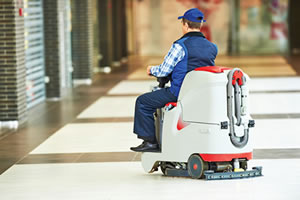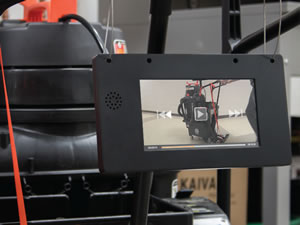Educating Custodial Workers

PHOTO © DMITRY KALINOVSKY
Many education administrators have never heard of CIRI, the
Cleaning Industry Research Institute (www.ciriscience.org). Their
credo—”Only Science Can See”—provides some insight into who
they are and what they are all about.
The goal of CIRI is to bring more science into professional cleaning:
to introduce more scientific ways to evaluate cleaning, develop
cleaning standards, and help the cleaning industry find more effective
and long-lasting ways to teach workers state-of-the-art cleaning
methods that would be more effective, faster, and safer.
In July 2019, the organization held a symposium in Oxford, OH,
where the topic of education was the focal point. The presentation
was delivered by Bob Robinson, Sr., a 30-year veteran of the
industry and president of Kaivac, a leading manufacturer in the
professional cleaning industry.
The Development of Custodial Worker Training
Before discussing this presentation, let’s first discuss what we
know of custodial worker training. For decades, there was only very
informal training of cleaning workers… if there was any training
at all. Typically, workers were trained by the company or institution
they were working for at the time, and told how that company
wanted specific cleaning tasks performed. However, if they moved on to work with another cleaning contractor
or institution, the new employer often had
entirely different ways of performing those
very same tasks, and so the worker would
need to be trained all over again.
“There were no standards when it came
to training,” says Robinson. “In many
ways, one of the most essential things in
professional cleaning—custodial training—was a free-for-all: you just did it the
way whomever you worked for did it.”
Slowly, that view started changing. By the
1980s, new and more advanced cleaning tools
and equipment were introduced. Distributors
and cleaning equipment manufacturers
started training workers on how to best use
their new equipment, and in the process, they
improved their overall cleaning skills.
While this was a significant step
forward, it was the introduction of green
cleaning in the 1990s and 2000s that most
strongly impacted the professional cleaning
industry and highlighted the importance
of training. It’s important to note
that in order to perform correctly, green
cleaning solutions and products had to be
used differently than traditional products
used in the past.
Further, green cleaning required, in
some cases, that entirely new cleaning
methods and procedures needed to be
learned. To address this major development,
ISSA, the worldwide cleaning association,
and GreenSeal introduced training
programs to help educate cleaning workers
in environmentally preferable cleaning
methodologies.

WATCH AND LEARN. Common learning styles include visual (learn by seeing), auditory (learn by listening), and tactile
(learn by doing). If your custodial training doesn’t address all three, some of your employees may not fully grasp the
subject matter. The use of videos can reinforce visual and auditory learning styles, and also allows employees to review
material as needed, enhancing their training.
The Cone of Learning
Because such detailed training was
somewhat new to the professional cleaning
industry, many employers and their employees
were in for a surprise. After cleaning
workers had attended formal classroomstyle
training or even informal training sessions,
it was soon discovered much of what
had been taught was forgotten within a few
hours, and certainly within a few days.
It’s possible, if the industry had known
more about the “Cone of Learning,” this
would not have been such a surprise. In
1946, American educator Edgar Dale studied
how much people retain under different
types of learning experiences. While there
is some controversy today as to his precise
findings, for the most part, Dale concluded
that after about two weeks, people retain
the following amounts using the following
training methods:
- Reading: About 10 percent of what is read.
- Hearing: Attending a seminar or lecture,
about 20 percent.
- Watching: Watching a video or a demonstration
of a technique, 50 percent.
- Doing: Performing a task that has just
been taught, as much as a 90 percent
retention rate.
However, according to Robinson,
“there can be other issues that come into
play when cleaning workers are taught
new cleaning procedures.” Among those
he pointed out in his presentation are the
following:
- Lack of motivation. Sometimes cleaning
workers do not “feel” they need to be
trained or re-trained on how to perform
certain familiar cleaning procedures.
- Resistance. Among all types of workers,
there is often a resistance to learning new
techniques. In some cases, it even causes
fear and distrust, which, in turn, can
block learning.
- Negative experiences. Sometimes
cleaning workers were trained on new
cleaning methods that resulted in accidents,
produced poor results, or garnered
complaints from customers or supervisors.
These negative experiences make
them reluctant to learn new techniques,
reasonably concerned that the same
thing could happen again.
Focus on What Works
At CIRI, Robinson presented a strong
argument that to advance custodial training.
“We have to focus on what works. If
videos are effective and if ‘doing’ what was
just presented in a video is very effective,
then a combination of the two could
potentially enhance custodial training
considerably.”
Robinson advises that certain caveats
must be considered, the most important of
which is having ready access to the training
materials.
“If a cleaning worker has been shown
how to use a machine, but they have forgotten
some key points, they are unlikely to go
online and find that specific video that discusses
it. They don’t have the time. The training
technology must be part of the cleaning
equipment. Quick and easy access is key.”
Robinson points out that having “onboard
tutors,” which at least one manufacturer
now puts on their equipment, is
essential. For instance, he said some cleaning
workers are embarrassed to ask their
supervisors more than once how to perform
specific tasks. “If the video is right on the
equipment and handy, they can watch [the
video] and not feel any awkwardness.”
In his experience, he also mentioned
that this quick and easy access boosts
confidence levels and enhances overall
satisfaction, since cleaning workers are
performing their work correctly and in the
most effective way possible.
“It can also increase worker retention,”
Robinson adds. “Turnover in the professional
cleaning industry, whether in-house
custodians or with private contractors,
is very high. Some studies indicate that
employee retention (staying on the job) can
jump as high as 50 percent with effective
and ongoing training programs.”
School Cleaning and
Education Administrators
As nearly all education administrators
know, properly and effectively cleaned
schools are crucial for many reasons. “Custodians
are the first line of defense of public
health in our schools,” says Pat Nicholson,
a custodial worker with the Brownsville
Elementary School in Bremerton, WA.
“The way we clean can largely determine
the level of health for students. “[Further], custodians become an integral
part of not only a healthy school, but also
the academic success of students.”
However, none of this is possible if
cleaning workers are not taught how to
clean properly. “I view proper cleaning as
both a science and an art,” adds Robinson.
“Today, the professional cleaning industry’s
biggest challenge is proper training.
It’s the key to healthy schools.”
If what Robinson has suggested proves
to be correct, this is one challenge the
industry can and should now be able to
address.
This article originally appeared in the College Planning & Management September 2019 issue of Spaces4Learning.